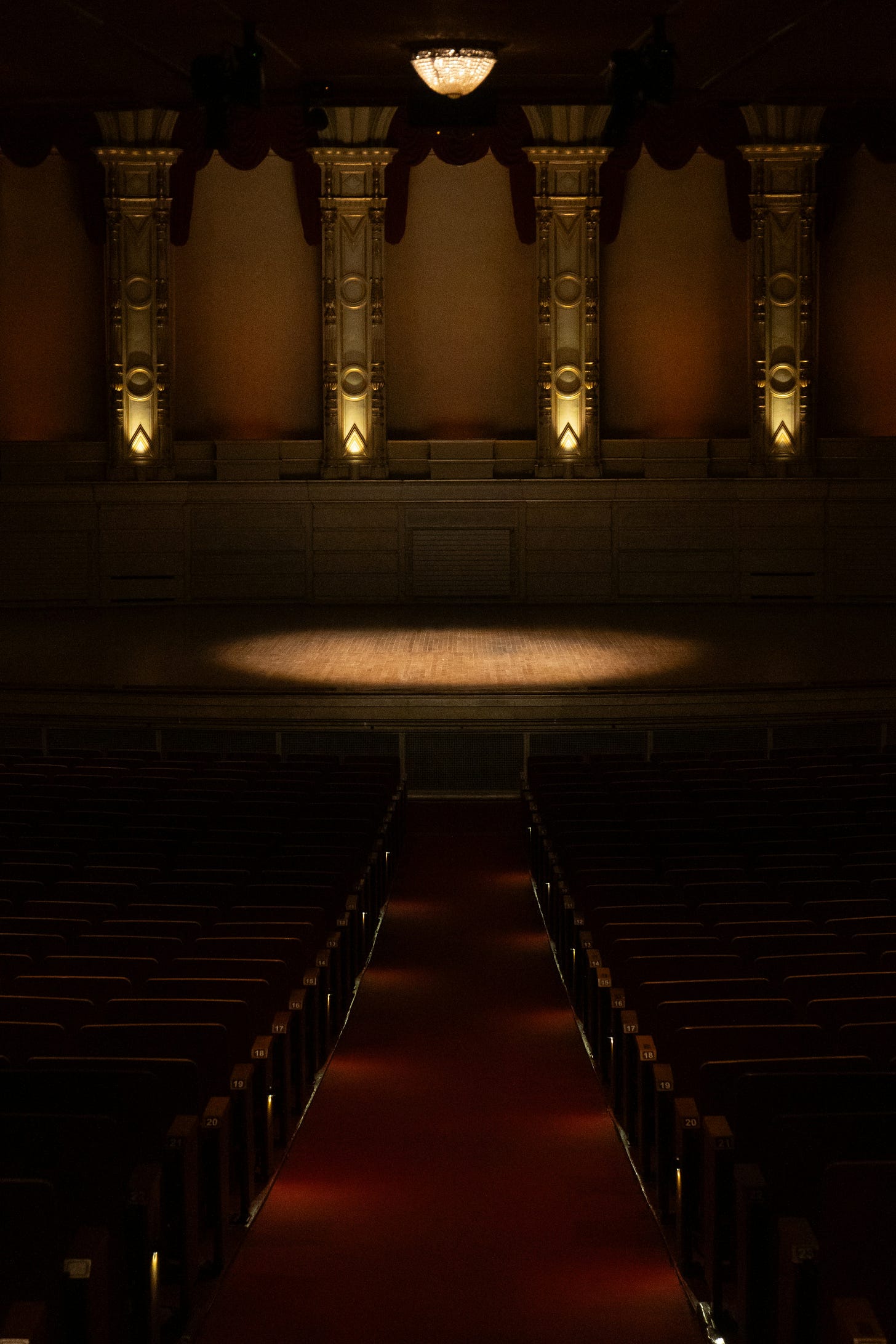
This piece was written as part of
’s Storyteller Course. The prompt was “A Time You Met Your Match.”It’s my turn to present at the Storyteller Summit.
Forty eager faces stare up at me as I click through the first slide.
“Today, we’re going to use improv techniques to craft more authentic stories,” I say, feeling completely at ease. Leading two 45-minute sessions—one on improv storytelling, another on creating memorable characters—feels natural now.
But it wasn’t always this way.
“Just say something. Anything at all.”
I heard that phrase a lot growing up—usually when I’d meet someone new and freeze. It wasn’t that I didn’t have something to say. I was just afraid of saying the wrong thing. Looking dumb. Being boring. You know the deal.
College parties were my personal nightmare. Standing awkwardly with a red cup, overthinking every possible conversation starter while everyone else just… talked. I’d hover near the snack table, pretending to text someone important, secretly wishing I could join the laughter across the room.
Eventually, I’d warm up. I’d crack a joke or start a conversation. But it always took time. I never felt at ease with strangers or new situations—not in middle school, not in high school, and not even in my first year of college.
So, in my sophomore year, I did something unexpected.
I enrolled in an improv class.
Our class met in an old portable classroom—the kind you'd expect behind a high school, not on a college campus. Mismatched chairs scattered in a loose circle. Flickering fluorescent lights overhead. It felt like a strange little island of experimentation, tucked away from the polished lecture halls just a few hundred feet away.
I figured we’d be doing sketch comedy or silly games. But the first day jolted me out of that expectation.
We were instructed to stand a foot apart from a stranger and stare into their eyes. No talking. No smiling. Just… exist.
My mouth went dry. My heart raced. I remember noticing the tiny specs in the whites of her eyes, the way her pupils flickered slightly. It was awkward. Intimate. Disorienting.
And it was only the beginning.
Each class pushed me further out of my comfort zone.
Like the time we roleplayed as school counselors helping struggling students. When my turn came, the TA transformed—slouched posture, mumbled speech, total avoidance of eye contact.
At first, I panicked. I asked stiff, textbook questions that led nowhere. But watching him fully commit to the character shook something loose in me. I stopped trying to “do it right” and started actually listening. I responded, not with a plan, but with presence.
That shift cracked something open. I didn’t need to be clever—I just needed to be real.
Then came the final challenge.
A storybox performance: a volunteer steps into a faux room with four white walls. They’re not told anything. They just react, and the rest of us build an improvised world around them—on the spot, with no rehearsal.
To make things even more intense, I invited my friend Grant to be the volunteer. Grant was a fellow digital media major with an adventurous streak—the kind of guy who says yes before you finish the sentence. I trusted him not to sabotage the scene or steal the spotlight.
But still… he was my friend. This wasn’t just performing in front of strangers anymore. The stakes felt personal.
And yet, when the moment came, I wasn’t nervous. I was… excited.
I couldn’t tell you what the scene was about now. Only that it worked. We did it. We pulled something magical out of thin air.
Afterward, Grant grinned and said, “That was so fun—I’m taking this class next semester.”
The funny thing was, despite being pushed out of my comfort zone week after week, I never once considered dropping the class.
Every Tuesday and Thursday, I looked forward to whatever bizarre exercise was waiting for us. The discomfort had become… exciting. A challenge, not a threat.
Since then, improv has become one of my favorite things. It’s changed my life in quiet but powerful ways. I use the skills all the time—at networking events, client calls, even casual conversations.
Things that once filled me with dread—talking to new people, hosting a podcast, pitching creative ideas—now feel like playgrounds. Not because I’ve stopped being nervous. But because I’ve learned how to dance with the nerves.
Even my family notices.
“Remember when you used to be afraid of talking to waiters?” my mom asked after one of my shows. “Now you’re performing in front of strangers!”
We both laughed. But I caught the pride in her eyes. She remembers the version of me who froze at “just say something.”
We all have fears that stop us in our tracks.
But sometimes, when you lean in instead of running away, those fears turn into something unexpected:
Your next strength.
Your next passion.
Your next story.
And if you’re lucky, they might even lead you to a stage—teaching others how to find their voices too.
I’d love to hear your version of this—what’s a time you met your match? Or just let me know what this story sparked for you.



